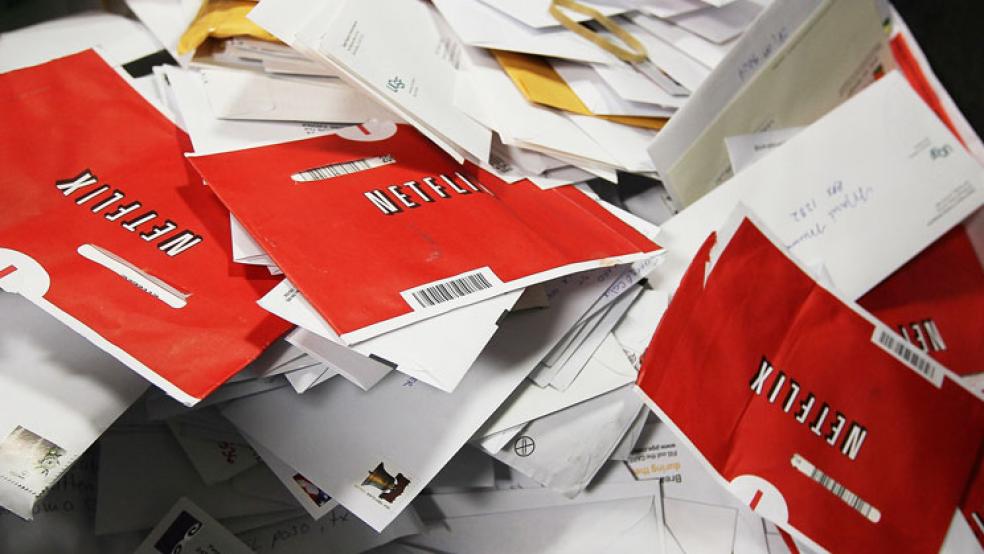It's good when you get what you pay for. It's even better when you get what other people pay for. Such will soon be the case for streaming customers of online video service Netflix (NASDAQ: NFLX).
The company announced Sunday that it will pay Comcast (NYSE: CMCSA) for direct access to its broadband network instead of paying middlemen to deliver its streaming video to the cable company. Netflix will install special servers — called "caching boxes" — at the cable giant's local data centers that will help ensure customers a smoother streaming experience.
Neither Netflix nor Comcast is discussing the terms of the deal, but The New York Times is reporting that "a person close to the companies said it involved annual payments of several million dollars." Netflix is going to such expensive lengths to ensure its streaming customers are happy because of how much revenue they generate. In 2013, domestic streaming accounted for 61 percent of the video giant's total revenue.
Related: House of Cards Is the Media Crack for Netflix Addicts
The deal represents a significant change in strategy for Netflix, and it is generating significant criticism.
Netflix Flips
CEO Reed Hastings had resisted paying Internet service providers, arguing that his company’s streaming content was driving high-speed broadband subscriptions for the same cable providers that wanted to be paid by Netflix. Comcast’s agreement to buy Time Warner Cable may have helped change his mind. Comcast already represented a large portion of Netflix’s subscriber base, and Netflix claimed that streaming speeds for content delivered via the cable giant had slowed by more than 25 percent recently — definitely not the way to keep their customers happy and the money coming in.
“We suspect Netflix realized Comcast represented far too large a percentage of Netflix’s overall subscriber base for Netflix to allow this problem to continue,” BTIG Research Analyst Richard Greenfield wrote in blog post (registration required) Sunday night. Comcast’s deal for Time Warner would give it even more clout — and make those slow speeds even more of a threat.
Yet while Netflix and Comcast touted the deal as “mutually beneficial,” critics are crying that the arrangement violates, or at least threatens, "net neutrality" — the idea that all web content providers have equal access to the means of distribution. Net neutrality is an official operating principle of the Internet, adopted in December 2010 by the Federal Communications Commission in its "Open Internet Report & Order."
At least in part, the FCC's Open Internet R&O was designed to keep large companies with lots of money from dominating the Internet, yet that's precisely what many fear is happening here. Last month a Federal appeals court "vacated" a significant portion of the ruling, so it may be no coincidence that this deal has come so quickly on the heels of that decision. In the wake of the ruling, federal regulators are writing new rules, expected to be finished later this year.
Of course, Netflix and Comcast assert they're doing nothing wrong, or nothing that isn't already being done. In a joint statement announcing the deal, they write: "[We've] established a more direct connection between Netflix and Comcast, similar to other networks, that's already delivering an even better user experience to consumers. Netflix receives no preferential network treatment under the multi-year agreement."
Other companies that generate heavy traffic, like Google and Facebook, already had such deals with Internet providers, so in that regard what the two companies say in their joint statement could be construed as accurate. But it's this direct payment — particularly of potentially large and growing sums — to a broadband service provider that's raising concerns that the deal sets the stage for a two-tiered Internet.
Legalities, digital-age ethics, and the arcanities of how the Internet is or isn't supposed to operate aside, thoughtful online video consumers should also remember there's no such thing as a free lunch. If Netflix has to pay up to smooth its streaming service with one service provider, it will have to pay up to others. The precedent will be set, and the money for it will have to come from somewhere — if not right now, eventually.
While some analysts point out that the deal will save Netflix money now since it will pay less to Comcast than it had been to the middlemen, that may not always be the case. The cable giant will "raise the price to whatever the market will bear," Wedbush Securities analyst Michael Pachter told the Los Angeles Times the day the arrangement was announced "This will ultimately compel Netflix to raise prices to consumers." In the end, smoother streaming will no doubt be welcomed by Netflix customers, though it's unlikely higher subscriber fees will.
Top Reads from The Fiscal Times:
- 10 Infuriating Consumer Fees to Stop Paying Now
- Want to Be Happier at Work? Ask These 3 Questions
- 10 Surprising Taxes You May Have to Pay





